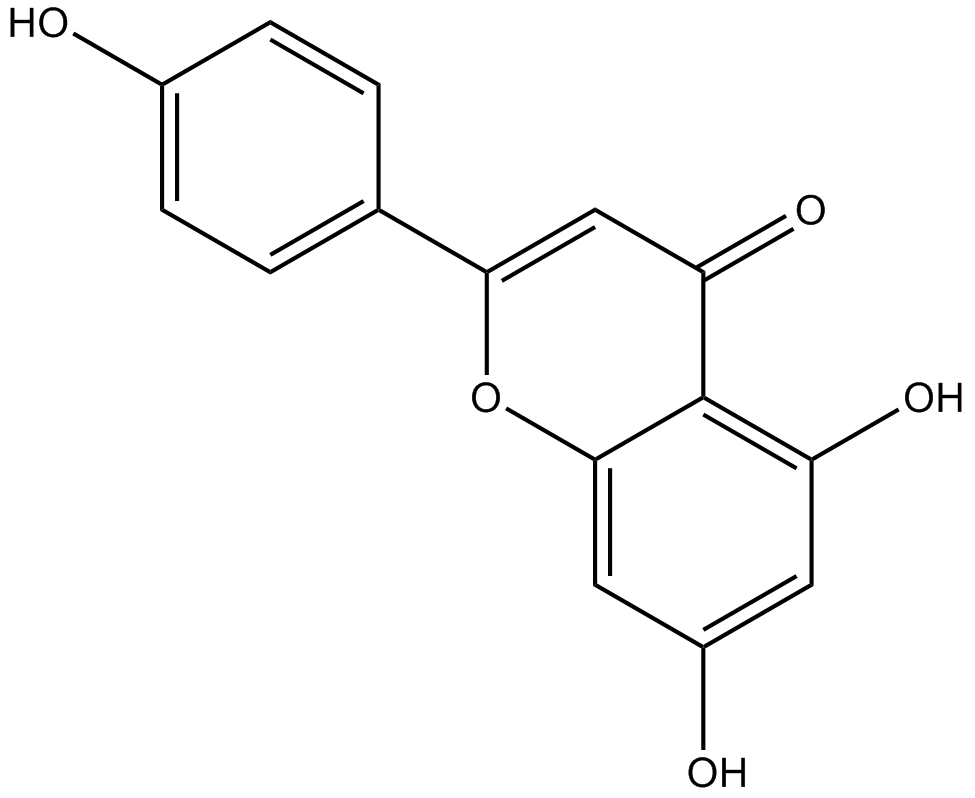Apigenin (Synonyms: Chamomile, Flavone, NSC 83244, Versulin) |
| Catalog No.GN10150 |
Apigenin (API) is a competitive CYP2C9 inhibitor with a Ki of 2 µM..
Products are for research use only. Not for human use. We do not sell to patients.

Cas No.: 520-36-5
Sample solution is provided at 25 µL, 10mM.
Apigenin (API), or 4′,5,7-trihydroxyflavone, is a bioactive flavonoid present in many plants, known for its anti-inflammatory, antioxidant, and anticancer properties. Apigenin is a competitive inhibitor of CYP2C9, with a Ki of 2 µM[1]. It inhibits the activation of the Wnt/β-catenin signaling pathway and the activity of NF-κB, and blocks the phosphorylation of c-Met and its downstream effectors[2].
In vitro, apigenin (6.25-100 µM) shows dose- and time-dependent cytotoxic effects on malignant mesothelioma (MM) cell lines[2]. After 72 hours of treatment with apigenin, the IC50 values for MM-B1, MM-F1, and H-Meso-1 cells were 49.16 ± 2.52µM, 46.95 ± 1.69µM, and 34.31 ± 1.55µM, respectively[2]. Treatment of SGC-7901 cells with apigenin for 48 hours at concentrations of 20, 40, and 80µmol/L resulted in apoptosis rates of 5.76%, 19.17%, and 29.30%, respectively. Apigenin exhibited dose-dependent effects on the growth, colony formation, and proliferation of SGC-7901 cells[3]. Apigenin (0-50 µg/ml) inhibited the proliferation of T-24 cells in a dose-dependent manner and, after 12 hours, increased the levels of ROS while depleting GSH in T-24 cells[4].
In vivo, treatment with apigenin (20mg/kg, intraperitoneally) in C57BL/6 mice reduced the growth of transplanted malignant mesothelioma MM cell lines in the peritoneal cavity of the mice[2]. Treatment with apigenin at doses of 125mg/kg or 250mg/kg in mice with ADR-induced cardiomyopathy via gastric gavage for 17 days increased the phosphorylation of AKT and mTOR in cardiac cells, as well as the expression of PI3K, and reduced apoptosis and autophagy in cardiac cells[5].
References:
[1] Si D, Wang Y, et al. Mechanism of CYP2C9 inhibition by flavones and flavonols. Drug Metab Dispos. 2009 Mar;37(3):629-34.
[2] Laura M , Monica B , Rosanna M ,et al. In Vitro and In Vivo Anti-tumoral Effects of the Flavonoid Apigenin in Malignant Mesothelioma[J].Frontiers in Pharmacology, 2017.8:373.
[3] Wu K, et al. Inhibitory effects of apigenin on the growth of gastric carcinoma SGC-7901 cells. World J Gastroenterol. 2005 Aug 7;11(29):4461-4.
[4] Shi M D , Shiao C K , Lee Y C ,et al.Apigenin, a dietary flavonoid, inhibits proliferation of human bladder cancer T-24 cells via blocking cell cycle progression and inducing apoptosis[J].BioMed Central, 2015(1).
[5] Wei Y , Huirong S , Wenliang Z ,et al.Apigenin Attenuates Adriamycin-Induced Cardiomyocyte Apoptosis via the PI3K/AKT/mTOR Pathway[J].Evidence-based Complementary and Alternative Medicine, 2017, 2017:1-9.
Average Rating: 5 (Based on Reviews and 30 reference(s) in Google Scholar.)
GLPBIO products are for RESEARCH USE ONLY. Please make sure your review or question is research based.
Required fields are marked with *




















